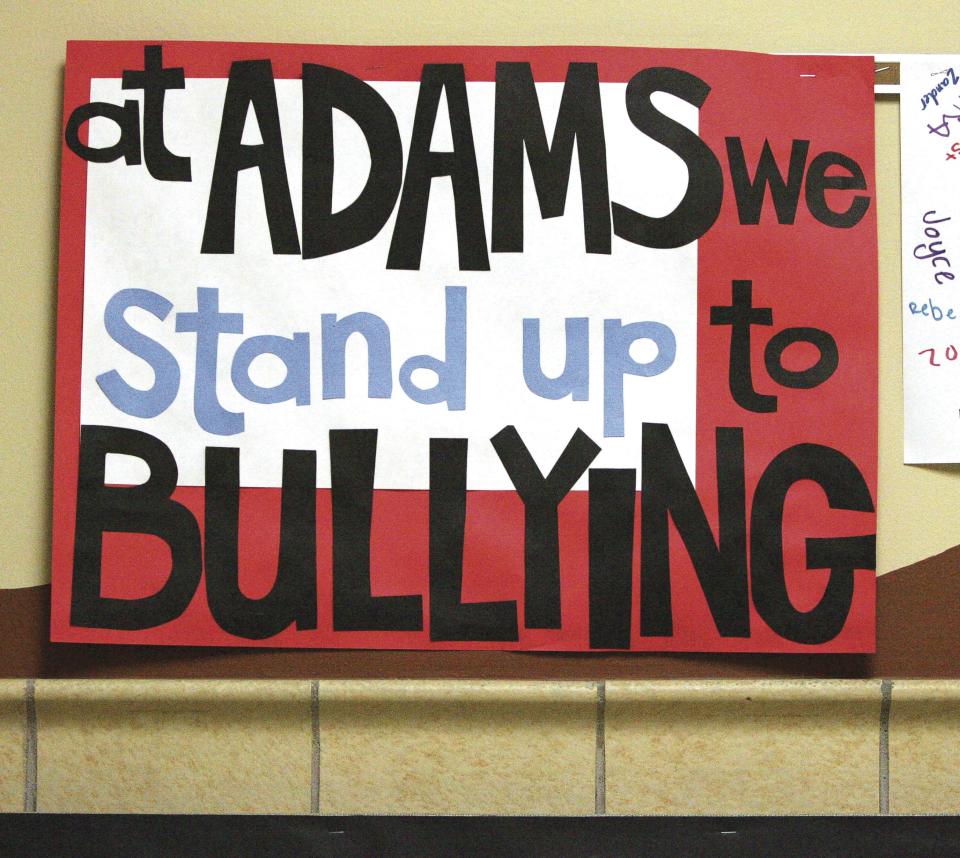Why this nation needs to hit the reset button on bullying, online trolling and intimidation
- Oops!Something went wrong.Please try again later.
During a final soccer game of this year's European Championship, three Black players on England’s national team suffered “a wave of online abuse … with monkey and banana emoji and racist comments posted underneath photographs of the players on their personal Instagram accounts,” according to a Washington Post report.
In her chart-topping single “Sorry Not Sorry,” wildly popular singer and songwriter Demi Lovato recalls the devastating impact that bullying had on childhood. And in recent years, Laverne Cox, the first openly transgender person nominated for an Emmy for acting, has been quite vocal about being "harassed and bullied my whole life.”
Bullying, of course, isn’t something reserved for famous athletes and celebrities. Unfortunately, so-called internet trolling and bullying culture have become such ubiquitous parts of our digital consciousness that many of us have grown numb to its long-term effects. But we must remain vigilant.
Bullying can zig zag across life
Amid the omnipresence of digital life, bullying often zig zags across our students’ classrooms as well as the workplaces we share. That’s why it’s more important than ever for us to equip our students with the tools they need to stand up to abuse, mistreatment and bullying – in any form and whenever they see it.
Whether we’re talking about a kindergartner, a high schooler or an adult learner, the classroom should be the primary space where every student feels respected and safe (and not just physically). Safety also means students have the freedom to articulate their feelings, thoughts and ideas without fear of being mocked or ridiculed.
Racism triggers me to drink. Zoom-bombers won't let me be Black in AA meetings

Unfortunately, that’s not the case for every student. According to data published by the National Center for Education Statistics, 41% of students ages 12 through 18 who have been bullied at school fear the intimidation isn't over.
In a country in which the average teen spends seven plus hours a day on videos, smartphones and other screen time, each of us – corporate executives, nonprofit leaders, school officials and community members – must do everything we can to protect our kids from bullying culture, whether that is in person or online. At the same time, we must help them strengthen their sense of self-worth, so they never feel the impulse to mistreat their peers, the adults in their lives or others.
Courtney Stodden: I called out Chrissy Teigen's cyberbullying years ago.
That means establishing zero-tolerance rules at home when it comes to bullying; helping students understand how their language and behavior impact others; planning social activities and events that foster self-esteem and teamwork; and encouraging students to focus on their assets and those of others.
Teach compassion, kindness, empathy
If you’re waiting on reality television stars or other public figures to teach your children these vital life lessons or to become ideal role models, you’ll be waiting a long time. There’s certainly no shortage of digital and TV content that’s largely dedicated to highlighting betrayal, physical fighting and public humiliation. These types of incidents are so prevalent that award-winning, late-night talk show host and comedian Jimmy Kimmel has a special segment devoted to the “very nasty things” people write on social media titled #MeanTweets.
But trolling antics should not be viewed as entertainment nor business as usual. In fact, this kind of viral trending simply shouldn’t continue to be normalized. Despite our culture’s hyper focus on clicks and likes, views and followers, our kids must understand that the opinions of others are secondary to the way they feel about themselves.
A teacher's question: Social media hurts my students, but do tech executives even care?
According to a report by the Centers for Disease Control and Prevention, bullying can increase “the risk for depression, anxiety, sleep difficulties, lower academic achievement, and dropping out of school.” Our students don’t have to suffer this fate. We have the power to do something about it.
As a society, we have so many social and economic challenges ahead of us. And we need our kids – our world’s future decision-makers – to be experts in problem solving, rather than people-judging. This National Bullying Prevention Month, we’re renewing our commitment to teaching students the value of compassion, kindness and empathy. We urge you to do the same.
Kevin P. Chavous, a former Washington, D.C. City Council member, is an attorney, author, education reform activist and president of Stride. He’s also the host of the podcast "What I Want To Know with Kevin P. Chavous."
Ross Ellis is a bullying prevention expert and chief executive officer and founder of STOMP Out Bullying™. She has more than 20 years of experience in the nonprofit and corporate sector and has been a child advocate for more than two decades.
You can read diverse opinions from our Board of Contributors and other writers on the Opinion front page, on Twitter @usatodayopinion and in our daily Opinion newsletter. To respond to a column, submit a comment to letters@usatoday.com.
This article originally appeared on USA TODAY: Bullies, trolls, online abuse affect kids, celebrities and workplaces

